Chorley family try to raise £100k for research into cure for son's rare genetic condition
and live on Freeview channel 276
Keri, 39, and 42-year-old Ian Brooks from Eccleston are trying to raise much needed funds for son Owen who doctors took six years to reach a diagnosis of Primary Ciliary Dyskinesia (PCD) - a rare, inherited condition that affects several organs and gets worse over time.
Children with PCD have a problem with mucus build-up, which leads to inflammation in the airways and infections in the lungs, nose, sinuses and ears.
Advertisement
Hide AdAdvertisement
Hide AdSince being diagnosed Owen, who attends Mawdesley St Peter’s C of E Primary School, has had many hospital stays for IV antibiotic and steroid treatment in an attempt to treat chest infections and slow the progression of lung damage already present due to the late diagnosis and a decline in lung function.
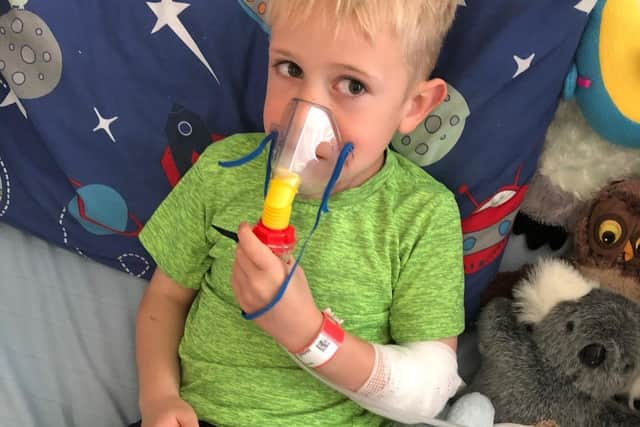

He has to endure two hours of chest physio per day to keep his sinuses clear which entails an hour in the morning before school and one before bed, which includes nasal rinsing with salt water which also reduces the chance of infection.
Why did it take six years for a diagnosis for Owen?
Explaining how the past six years have consisted of numerous hospital trips, tests and scans to try and work out what was wrong with her son, a helpless Keri who works at HW Moon Toyota in Wigan as a sales administrator, added: "Our son, Owen was born with Primary Ciliary Dyskinesia (PCD), he's nine now but it took us six years to get a diagnosis.
"We always knew something was wrong. We hadn’t heard of this condition before he was diagnosed.
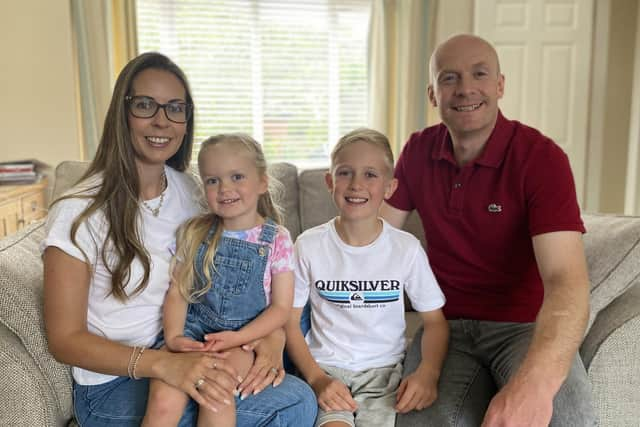

Advertisement
Hide AdAdvertisement
Hide Ad"Consultants at Manchester Children’s Hospital had mentioned it as a possibility, but to be honest we didn’t take much notice it as it was so rare.
"At six weeks old we took Owen to an emergency doctor in the middle of the night as his breathing was really loud and sounded like he couldn’t clear it his chest.
"We were told that he probably had a cold as he was a winter baby. We went back to the GP when he hadn’t improved a couple of weeks later who said it would probably disappear when he started sitting up but referred us to Preston Hospital.
"We were told that he had postnasal drip and that it would probably improve when the weather became warmer or he started running around more."
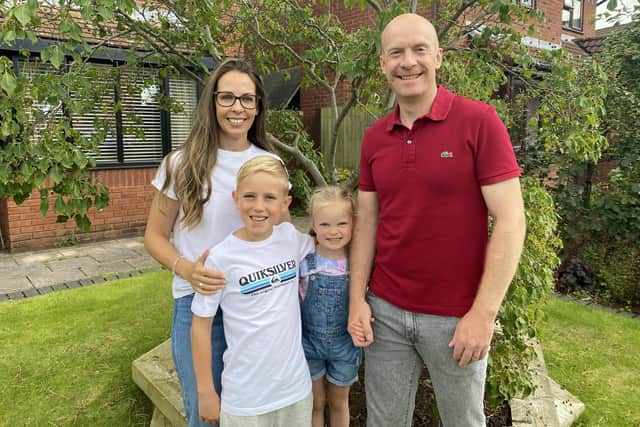

Advertisement
Hide AdAdvertisement
Hide AdAt each hospital appointment doctors tried something different such as inhalers, reflux medication, asthma medication, but to no avail.
Keri continued: "At the age of two we discovered Owen had many food allergies so we were referred to Wigan Hospital for this and during the routine appointments we continued to mention his cough."
Keri and Ian - a Technical Director for Additure in Daresbury, also have another child in the form of three-year-old daughter Sophie who has also been tested for the condition which thankfully came back negative.
How has Owen's diagnosis affected the family?
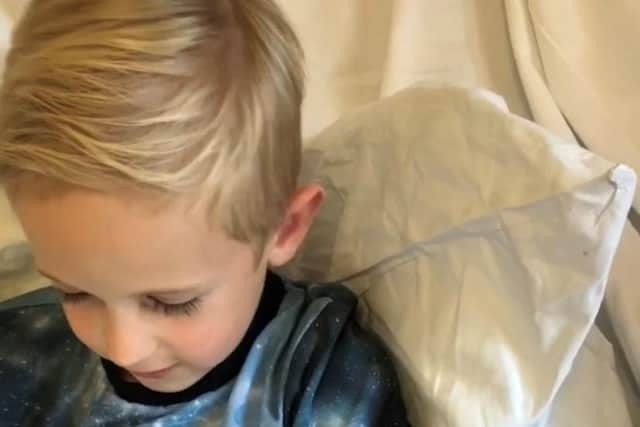

Touching upon the huge impact PCD has had on her son's life when he should be out playing football with his friends, she added: "PCD is invisible, many people say there doesn’t look like there’s anything wrong with him so don’t realise the severity of it."
Advertisement
Hide AdAdvertisement
Hide Ad"The burden of daily physio, antibiotics, probiotics, keeping active, staying healthy and out of harm's reach from infection and germs is a task in itself for the family, as catching a simple cold could equal pneumonia for Owen.
"Lots of school has been missed due to hospital admissions and appointments, blood tests, lung function tests, the stress of hospital procedures is a huge part too as Owen is needle phobic.
"They did x-rays at two different hospitals but didn’t notice the shadow to be lung damage as they presumed he’d recently been unwell.
"At the age of two we discovered Owen had many food allergies so we were referred to Wigan Hospital for this and during the routine appointments we continued to mention his cough.
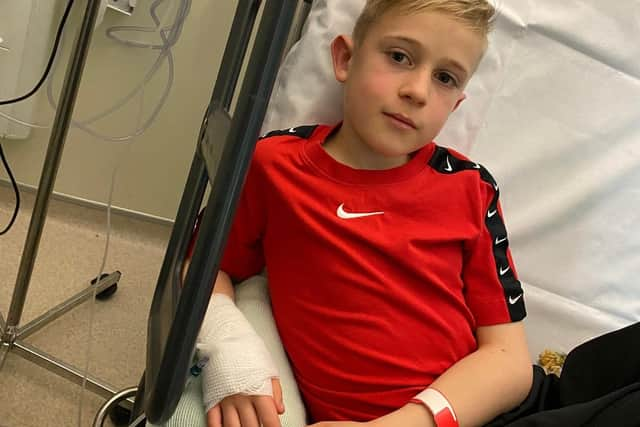

Advertisement
Hide AdAdvertisement
Hide Ad"We were eventually referred to Manchester where they did an x ray and compared it to the previous ones noticing that the patch of damage (called bronchiectasis) on Owen’s middle right lung was present on all of them. They also did a CT scan and arranged a test for cystic fibrosis.
"When that came back negative they arranged a test for Primary Ciliary Dyskinesia which involves a biopsy to be taken from deep inside the nose and then the live sample to be taken to a lab in Leicester to examine the cilia.
"It takes three months for the results which we received two weeks before I was due to give birth to our daughter and although we were relieved we had an answer our worlds were also turned upside down.
"When Sophie was six weeks old Owen went into Manchester for a bronchoscopy procedure, intensive chest physio and to start two weeks of IV antibiotics.
Advertisement
Hide AdAdvertisement
Hide Ad"It was an incredibly difficult time. We were trying to get our heads around the diagnosis, learning all the treatments and medication he now needed, juggle who was staying at hospital with Owen whilst looking after a newborn and all the while realising that our son's life was now going to take a different path to the one we had hoped for him."
At present the only treatment for PCD is chest physiotherapy to try to prevent and slow lung function decline. PCD is a life altering and life shortening condition, and people with PCD have been found to have worse lung function than those with cystic fibrosis. This will mean for some people that they will need a lung-transplant.
What's next for the family?
There is currently no cure or specific treatment and a path of treatment akin to cystic fibrosis is followed because more people are affected by it, the funds are available which is proven with the recent development of the new drug.
The aim for PCD patients like Owen is to stay as healthy as possibly to reduce infections and therefore slow the progression of lung damage.
Advertisement
Hide AdAdvertisement
Hide Ad"Owen sometimes grows bacteria that are resistant to standard antibiotics and these can further increase the damage to his lungs. There is a high chance that he will become resistant to the antibiotics he regularly takes therefore they would not be successful in eradicating infections.
"Having a child with a progressive disease can make you feel helpless and lonely at times so we felt we had to do something positive, which is why we decided to fundraise for research that would benefit Owen and the others with PCD."
How much has been raised so far?
Keri and family set the target of raising £100k towards research, and have spent the year relentlessly planning events and other fundraisers to help reach this significant sum.
They have already raised over £35k this year through various events and have many other events and initiatives in the pipeline.
Advertisement
Hide AdAdvertisement
Hide AdPCD is a lifelong, genetic disease with only around 1,000 people in the UK currently diagnosed.
It's extremely important to have an early diagnosis and to manage the condition on a daily basis as these infections, even with treatment, will eventually cause scarring on the lungs (bronchiectasis) and a gradual decline in lung function.
Unfortunately, Owen already had lung damage when he was diagnosed and, despite all best efforts, this has worsened over the last three years. As this is such a rare condition it means that it's very hard to establish the outlook for Owen.
The only current treatments are intended to slow the progression of the disease.
Advertisement
Hide AdAdvertisement
Hide AdKeri added: "It is a progressive condition and, no matter how rigorous we are with his physio and careful with cleanliness and what he is exposed to, we can't change that.
"At the start it felt good that we could do something positive through physio and diet/keeping healthy but it soon became apparent that it wasn't enough. Our target is high but it can't pay for any unique treatment that is going to help Owen, the treatments simply don't exist.
"We want to raise some money to go to research so Owen and others like him have, at the very minimum, specific treatments for their condition and, at best, ultimately a cure."
“We will be organising and taking part in events throughout the year in the hope to raise as much as we can.
Advertisement
Hide AdAdvertisement
Hide Ad"We are splitting the total between the two charities associated with PCD, PCD Support UK and PCD Research both of which we are in close regular contact with and receive support and advice from.”
Future events include a family live music day at Eccleston Cricket Club on Sunday, August 28.
Tickets are available through Eventbrite on: 07732427871.
A midnight walk from Chorley to Eccleston will also take place on Friday, September 2.
All details of up and coming events can be found on the social media pages @100gforpcd.
If you would like to make a donation CLICK HERE.
Comment Guidelines
National World encourages reader discussion on our stories. User feedback, insights and back-and-forth exchanges add a rich layer of context to reporting. Please review our Community Guidelines before commenting.
